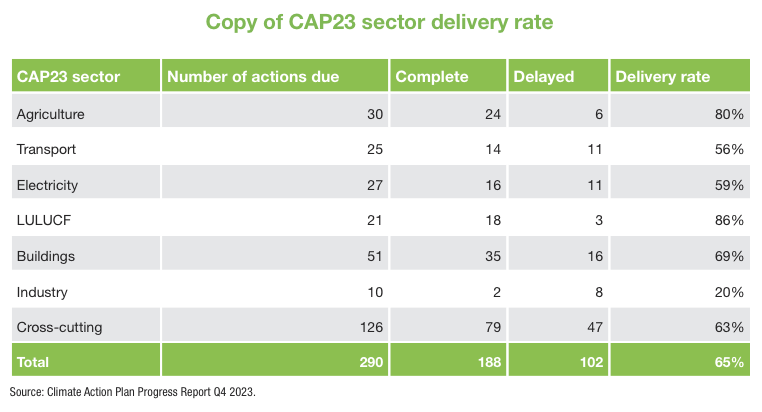Creation of just transition committee among climate action delays

Over one-third of the actions outlined in Climate Action Plan 2023 have yet to be implemented, the Government’s latest progress report indicates.
Climate Action Plan 2024 (CAP24), the Government’s annual roadmap for reducing carbon emissions and tackling the climate crisis was approved in December 2023 and includes corrective actions to address the recognition that emissions reductions to date fall short of the level of abatement required to meet national and international targets.
The Government is legally obliged to halve the State’s emissions by 2030 and achieve net zero greenhouse gas emissions by 2050.
CAP24 is the third annual update to the Climate Action Plan, but the second following the publication of the Climate Action and Low Carbon Development (Amendment) Act 2021, which introduced binding carbon budgets and sectoral emissions ceilings.
However, following its publication, the Government also released the final progress report on CAP24’s predecessor with an indicated implementation rate of just 65 per cent for actions between Q1 and Q4, with only 188 of a total 290 actions being completed.
In the final of four progress reports for 2023, it is indicated that 161 actions were scheduled for delivery and reporting in Q4 2023, 96 of which were completed, equating to a 60 per cent implementation rate.
While each department has varying levels of actions to implement, reflecting the whole-of-government nature of the Climate Action Plan, a delivery rate for each is available.
The Department of Enterprise, Trade and Employment (DETE) (four actions), the Department of the Taoiseach (one action), and the Department of Foreign Affairs (one action) all recorded 0 per cent delivery rates.
Unsurprisingly, the Department of the Environment, Climate and Communications (DECC) had the most actions assigned for Q4 of 2023 (65) but completed less than half of those (32), equating to a 49 per cent delivery rate.
The department with the second greatest number of actions (26), the Department of Agriculture, Food and the Marine (DAFM) achieved a completion rate of 81 per cent.
The Department of Social Protection (DSP) (one action), the Department of Finance (three actions), and the Department of Further and Higher Education, Research, Innovation and Science (DFHERIS) (six actions) all recorded 100 per cent delivery.
Sectorally, over the course of 2023, the buildings sector was the busiest, with a 69 per cent delivery rate on its 51 actions. The LULUCF (86 per cent) and agriculture sectors (80 per cent) recorded the highest delivery rates, while industry recorded the lowest delivery rate of 20 per cent, completing just two of its 10 intended actions.
Cross-cutting actions, of which there were 126, had a 63 per cent delivery rate.
In total, 102 actions were delayed under CAP23 including significant intended actions, such as the delivery of a national biomethane strategy, the publication of a national transport demand management strategy, and the launch of a small-scale electricity generation scheme.
Included in those delayed actions deemed as cross-cutting were the finalisation of a long-term climate strategy, the establishment of a just transition committee, a new green public procurement strategy and action plan, and a second whole-of-government circular economy strategy.
Recognising that “failure to complete climate actions now will result in steeper trajectories and decarbonisation pathways to bring sectors, society and the economy back on track”, the progress report points to several factors informing delayed action by departments including capacity and capability constraints, unexpected complexity, and some delay in final approval or publication.
A change to the nature of reporting for Climate Action Plan 2024 means that while 49 high-impact delayed actions will carry forward for delivery and reporting in Q1 2024, 53 “lower impact delayed actions” from CAP23 are closed off from continued centralised reporting.






